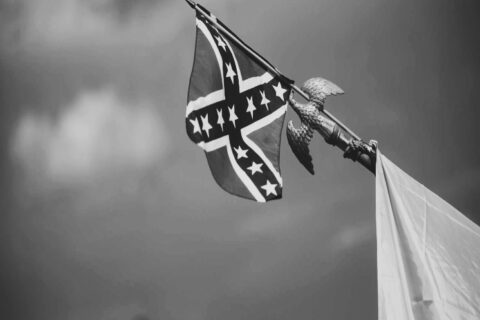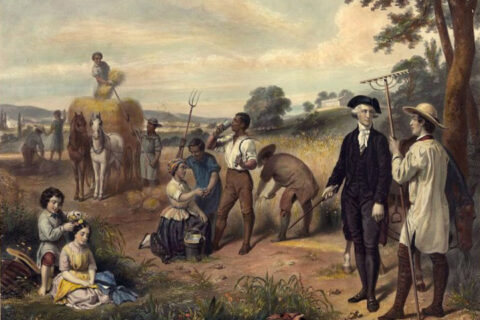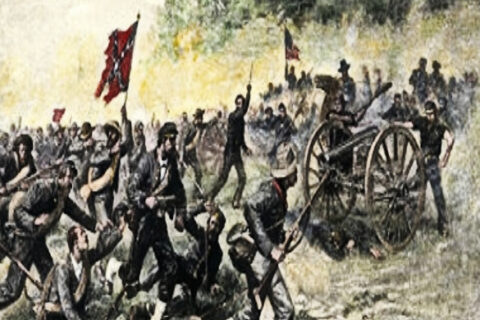‘Twas the night before Christmas and all through the camp,
Billie Yanks were a-stirring, by bonfire and lamp.
Bummers’ booty and plunder all hidden with secretive care,
In fear that General Sherman soon would be there.
T’ward the plight of Southern children left a-weeping in hunger and fear,
Not a foreign wretch among them so much as shed a tear.
Rebel mothers left ravaged, bodies beaten, an host defiled,
Their homes reduced to mere cinders, they to shift for shelter in the wild.
As I pondered the ghastly scene righteous anger filled my being,
I could hardly believe my ears, what they were hearing, mine eyes a-seeing.
When out from the darkness what wonder but suddenly appeared! –
A figure to behold, a Devil to be feared!
His beast was an mighty one – stern, magnificent steed,
Rider sat erect, face deranged with eyes deep-set of greed,
I knew in an instant this could only be General Sherman,
a demigod sat his mount afore the gaggle of foreign & Yankee vermin.
He lashed with the tongue as to crack with the whip,
He swore on God’s name, “In the bud shall I nip!”
His anger thence kindled, the great general thundered s’more:
“A trial of courts martial is reserved you in store.
“Let every man among you, and drummer boy too,
Take heed the awful fate – to each man his rightful due.
“Of the harvest you’ve deprived me, my spies have well told,
of fine linens, of silvers, of jewels, and trinkets-a-many of pure gold.”
When with an angry jerk of rein the mighty steed did suddenly rare,
I looked again to see if General Sherman might still be there.
As he rode into the blackness from whence his form at first appeared,
I heard him remind the wretches of a fate what most to be feared.
But then what to mine ears moments later should I hear? –
the deranged voice of the distant General singing a tune with demonic laughter, joy and cheer:
“Three-fifths to my coffers by dawn’s early light,
lest noonday on the morrow hang ye all at this site. Hang ye all at this site.”
And with that I heard the sinister voice echo yet one final line of spite,
“My due by sun up, or this fine Christmas Eve be to all your last night.
Be to all your last night.”
Extracted from the Southern Historical Society Papers, Volume 12, pg. 113:
The following letter was found in the streets of Columbia after the army of General Sherman had left. The original is still preserved, and can be shown and substantiated, if anybody desires. We are indebted to a distinguished lady of this city for a copy, sent with a request for publication. We can add nothing in the way of comment on such a document. It speaks for itself. The letter, which is a republication from the Alderson West Virginia Statesman, of October 29, 1883, is as follows:
Camp near Camden, S. C., February 26, 1865.
My Dear Wife:
I have no time for particulars. We have had a glorious time in this State. Unrestricted license to burn and plunder was the order of the day. The chivalry have been stripped of most of their valuables. Gold watches, silver pitchers, cups, spoons, forks, &c., &c., are as common in camp as blackberries.
The terms of plunder are as follows: The valuables procured are estimated by companies. Each company is required to exhibit the result of its operations at any given place. One-fifth and first choice falls to the commander-in-chief and staff, one-fifth to corps commander and staff, one-fifth to field officers, two-fifths to the company. Officers are not allowed to join in these expeditions, unless disguised as privates. One of our corps commanders borrowed a rough suit of clothes from one of my men, and was successful in his place. He got a large quantity of silver (among other things an old milk pitcher), and a very fine gold watch from a Mr. DeSaussure, of this place (Columbia).
DeSaussure is one of the F. F. V.’s of South Carolina, and was made to fork out liberally. Officers over the rank of captain are not made to put their plunder in the estimate for general distribution. This is very unfair, and for that reason, in order to protect themselves, the subordinate officers and privates keep everything back that they can carry about their persons, such as rings, earrings, breastpins, &c., &c., of which, if I live to get home, I have a quart. I am not joking. I have at least a quart of jewelry for you and all the girls, and some No. 1 diamond pins and rings among them.
General Sherman has gold and silver enough to start a bank. His share in gold watches and chains alone at Columbia was two hundred and seventy-five. But I said I could not go into particulars. All the general officers, and many besides, have valuables of every description, down to ladies’ pocket handkerchiefs. I have my share of them, too.
We took gold and silver enough from the d—d rebels to have redeemed their infernal currency twice over. I wish all the jewelry this army has could be carried to the Old Bay State. It would deck her out in glorious style; but, alas! it will be scattered all over the North and Middle States.
The damned n*ggers, as a general thing, preferred to stay at home, particularly after they found out that we wanted only the able-bodied men, and to tell the truth, the youngest and best looking women. Sometimes we took them off by way of repaying influential secessionists. But a part of these we soon managed to lose, sometimes in crossing rivers, sometimes in other ways. I shall write you again from Wilmington, Goldsboro, or some other place in North Carolina. The order to march has arrived, and I must close hurriedly. Love to grandmother and Aunt Charlotte. Take care of yourself and the children. Don’t show this letter out of the family. Your affectionate husband,
Thomas J. Myers, Lieutenant, &c.
P. S.—I will send this by the first flag of truce, to be mailed, unless I have an opportunity of sending it to Hilton Head. Tell Lottie I am saving a pearl bracelet and earrings for her. But Lambert got the necklace and breast-pin of the same set. I am trying to trade him out of them. These were taken from the Misses Jamison, daughters of the President of the South Carolina Secession Convention. We found these on our trip through Georgia. “T. J. M.”







Sherman was the first head of LSU.
Yes, for one year.
There must be a reckoning.
Amen!
Excerpt from the book ‘San Francisco’s Great Disaster: Earthquake, Fire and Volcano
California and Vesuvius. By Sydney Tyler. 1906. P. 390
Earthquake aftermath:
‘The executive committee, finding that the power they held was perfectly under control, and that there was no danger of any popular excesses, determined to continue their work and rid the country of the gang of ruffians which had for so long a time managed elections in San Francisco and its vicinity. These men were all well known, and were ordered to leave San Francisco. Many went away. Those who had refused to go were arrested and taken to the rooms of the committee, where they were confined until opportunities offered for shipping them out of the country * * *. The governor of California at this time was Mr. J. Neely Johnson * * *. The major-general of the second division of state militia (which included the city and county of San Francisco) was Mr. William T. Sherman ( afterwards well known in the world as General Sherman) who had resigned his commission in the United States Army and had become a partner in the banking house of Lucas, Turner & Co., in San Francisco. * * * toward the end of may Governor Johnson * * * appealed to General Sherman for advice and assistance in putting a stop to the Vigilance committee.’
Earlier in the book the author states that the San Francisco earthquake was the greatest financial disaster in earthquake history but was just a fraction of the financial loss compared to the destruction of Atlanta in TWBS.
Great article Sir. We still have our treasure and honor in Christ.
Merry Christmas and may God restore us to his favor in the upcoming year.
Thank you for your interest in and compliment on my little write-up, sir. You wrote:
Yes, there are numerous corroborating witnesses to these facts I have personally read over the years. One that comes to mind off the top of my head is contained in a note towards the end of “Georgia Girl,” Eliza Frances Andrews’s Wartime Memoirs. To wit:
You write:
Indeed! A few pages further on, Miss Andrews wrote:
Merry Christmas to you and yours, sir. And to all who read our site.
To clarify my book quote up above.
The Vigilance committee p. 388
“The story of the vigilance committee is amongst the most notable of San Francisco’s traditions. This association was organized on May 15, 1856. For some time the corruption of the courts of law, the insecurity of the ballot box in elections, and the infamous character of some of the public officials had been the subject of complaint, not only in San Francisco, but throughout the state of California”
The vigilance committee stopped the transfer of weapons to General Sherman and he resigned his post. The 5000 strong committee held their power.
I post this to show the corruption that had taken root in the US before the WBTS, and the corrupt character of the ruling party in SF after the war and their criminal lackey General Sherman.
Interesting and relevant information, sir. Thanks for posting it. I need to check out that book.